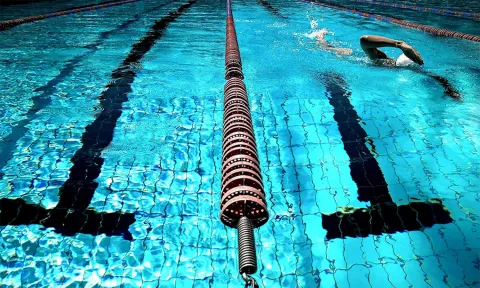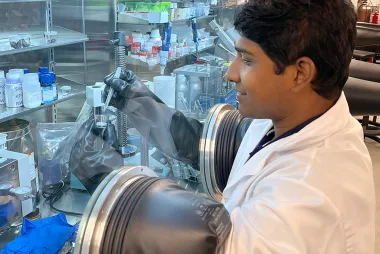UBC engineering researchers dive into ways to make public pools more environmentally sustainable

UBC Okanagan School of Engineering researchers are taking a deep dive into the analytical data of public aquatic facilities in an effort to minimize environmental impacts and make them more energy efficient.
With nearly 3,000 publicly owned aquatic facilities across Canada, municipalities are continually looking for ways to further reduce their environmental impacts while keeping operational costs manageable, explains Dr. Michael De Coste, a postdoctoral researcher with the School of Engineering's Life Cycle Management Laboratory.
Through the four-year community-based project, the researchers will develop best management practices for new and existing aquatic centres to optimize the operations of the facilities. The project will focus on three key pillars: water, health and energy.
“Over the course of this research, we’ll be monitoring water and air quality, building energy use and overall user experience,” said De Coste. “Comparing this data will paint a clearer image of the benchmarks required for aquatic facilities to meet their goals today and into the future.”
Three of British Columbia’s largest cities — Burnaby, Richmond and Kelowna — have partnered with the life cycle lab to identify new opportunities to address these areas through a new water-health-energy nexus approach. As part of the unique partnership, the researchers have access to the participating facilities and will be provided with the essential data to analyze the operational costs, energy consumption and user experience of each aquatic centre.
Along with the three cities, industry and regulatory partners, including the local health authorities, have joined in to determine methods to optimize aquatic facilities and, at the same time, keep staff and users safe. Industrial and commercial partners in this research include HCMA Architecture + Design, DB Perks and Associates Ltd, AME Group and Myrtha Pools.
The research team includes De Coste and Dr. Haroon R. Mian along with supervisors Drs. Rehan Sadiq and Kasun Hewage from UBCO’s Life Cycle Management Laboratory. The team is also collaborating with Dr. Andrea MacNeill from Planetary Healthcare Laboratory.
In particular, they will investigate and analyze the impacts of total energy use in each facility along with chemical use, total life cycle cost and thermal comfort. Their findings will help develop a dashboard platform to provide evidence-based tools for municipalities to leverage in their ongoing efforts to optimize energy consumption and minimize the health risks of users and staff while enabling a more cost-effective method of operation, explains Sadiq.
“All of the partners are leaders in sustainability and innovation, and have leapt right in sharing information that — once analyzed — will add to measures already in place that make new and existing aquatic facilities in these communities more sustainable and operationally less expensive,” he said. “We are excited at this opportunity to play a role in reducing the environmental footprint of aquatic facilities across the country.”



